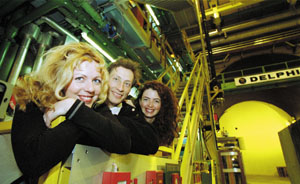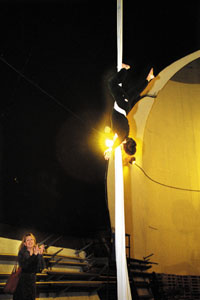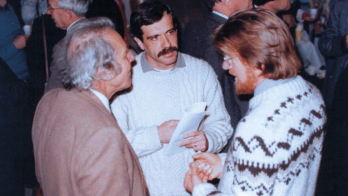At first sight, physics and theatre are difficult to mix, but this is no reason not to try. Together, the genius of Dirac, the dilemma of antimatter, an unusual setting and some physical and mental gymnastics make good entertainment.

This winter The Delphic Oracle,by Geneva’s Miméscope company in collaboration with CERN, ran for an extended season in the pit that houses the Delphi experiment at CERN’s LEP electron-positron collider. Using a matter-antimatter collider as the scene, the play focused on Paul Dirac’s mathematical discovery of antimatter symmetry.
Writing the script was a challenge – presenting the ideas of antimatter as entertainment, not as a scientific seminar. Renilde Vanden Broeck of CERN’s press office, following a diploma course in Science Communication at the University of London, chose to present the idea behind and the build-up to The Delphic Oraclefor her course dissertation.

In the following extract, Renilde describes some obstacles encountered on the way to presenting antimatter on stage. Just two weeks before opening night, Anne Gaud McKee of the Miméscope company and I are walking to CERN’s reception area. We are both very excited about the forthcoming play’s freshly printed posters and leaflets. She is picking them up to have them distributed all over Geneva. I tell her about the first interviews she will have to do tonight and that the press is really picking up. She is very excited and suddenly exclaims: “You haven’t heard the last yet: we changed the whole script!” I think I am going to faint! “I can’t believe it – just two weeks before the first night!” I shout.
Anne explains they had a crisis a couple of days ago. They had mainly been working on four set pieces and hadn’t really practised the actual lines that Markus Schmid (who plays Dirac) has to say. “What was wrong with it?” I demand. Anne explains that Markus and the others found her script too difficult and dry. So much abstract thinking out loud. What they disliked most of all was that it had become too focused on the science and less on the show. The script wouldn’t work with the acrobatics and dance the audience was to see, and that would kill their imagination. These dream scenes are so poetic…and then to revert suddenly to those dry sterile lines. “It would annihilate the whole atmosphere!” Anne objects, and we laugh at the word “annihilate” – after so long, physics terminology is seeping into our everyday speech. Anne explains that Markus refused to say lines he couldn’t feel. “I instinctively sense that he was right, that there was something awfully wrong with my scenario,” she continues, “and then suddenly it hit me – after all our discussions they hadn’t understood a key item of the play, the famous Scientific Process! And there was so little time left!”
“It all started when we were rehearsing the cosmos scene,” Anne explains. “That scene is all about the infinitely big. Dirac goes to the cosmos to look for antimatter because that is the natural result of his prediction. As much antimatter as matter should have been created by the Big Bang. Thus there should have been antigalaxies, antistars, etc.”
Antimatter or no antimatter?
But Dirac comes back from his dream empty-handed with no antimatter. So the cast concluded that antimatter doesn’t exist. I told them that this is simply not true. Scientists don’t know this yet for sure and are still searching with sophisticated detectors. “If antimatter is not up there, that doesn’t necessarily mean that it is down here instead,” I insist. “Maybe there’s another reason why nature preferred matter to antimatter. Perhaps Dirac thinks that there is a slight, almost undetectable, difference between the two. Maybe if he could study antimatter closely he could find this asymmetry.”
Later, putting these ideas to the cast, Markus objects immediately. “We can’t tell all that!” he shouts, “They’ll be totally confused!” “We have to,” I insist, “because we can’t say that there is no antimatter in space – we don’t know that yet, so Dirac thinks that there could be another explanation.”
Cast members Claire de Buren and Yasmina Krim agree, but point out “But then the ‘particle collision scene’ has nothing to do with his initial hypothesis.” “Exactly,” I reply. “That scene is there because he questions his first theory and follows another line – abandoning the idea of antimatter in space to instead explain the dominance of matter over antimatter. He thinks, if only I could have a close look at antimatter colliding with matter…that’s where the particle collision dream scene comes in.
That is how science works! You follow one road and when you find that it leads nowhere, you go back to the crossroads and choose another route. That’s what scientific research is all about,” I explain, feeling that they were beginning to see how science really operates. Anne agrees. “It would be good if we could make people understand that science is not a smooth road to a fixed objective, but full of twists and turns, doubts and questions.”
The cast just hadn’t seen that science could be so vulnerable and fragile. It was such a relief that they finally understood. “Better late than never,” Anne laughs.
Diary
When the penny drops, they bombard me with questions. Now they understand why CERN has such big machines. I tell them about CERN’s new antiproton decelerator and its quest to look for any subtle differences between matter and antimatter. “We can never explain this in one hour! What are we going to do now?” says a horrified Anne, realizing she still didn’t have the right formula to communicate the difficult antimatter message. The next day she starts over, calling in Claire and saying: “Tell me as soon as you don’t understand anything.”
“It’s all so abstract,” Claire objects immediately. “You should tie the ideas down to everyday things – Dirac’s gestures, for instance. Integrate his thoughts into the normal things that people do.”
This leads Anne to hit on a new formula for the script. Suppose Dirac writes letters expressing his feelings? She remembers learning about one important event in Dirac’s life, when his research supervisor at Cambridge, R H Fowler, received the draft of a key paper from quantum mechanics pioneer Werner Heisenberg. Fowler passed the paper to Dirac, who later said this was what got him started in quantum mechanics. Suppose there had been a mistake or misunderstanding in Heisenberg’s paper which Dirac spotted? Pure fiction, but that was the hook for the final script.
So Anne begins to write for Dirac: “My dear and respected colleague and friend, this night I stayed up until four o’clock in the morning, and could it be because of the exhaustion, that I have finally managed to solve the equation that you sent me two weeks ago.”
The ficticious letters make the difficult Dirac come alive on stage. While he goes about his everyday life, his mind struggles with strange equations and is bewildered by their implications. Reluctant to go against the scientific tide, he says: “No physicist has ever seen a positive electron…I hope you will not take me for a madman.”
From such bold predictions came antimatter.
The Miméscope company
Cast: Claire de Buren,
Anne Gaud McKee, Yasmina Krim, Markus
Schmid Scenario: Anne Gaud McKee Choreography:
Markus Schmid Music: Christian Denisart








